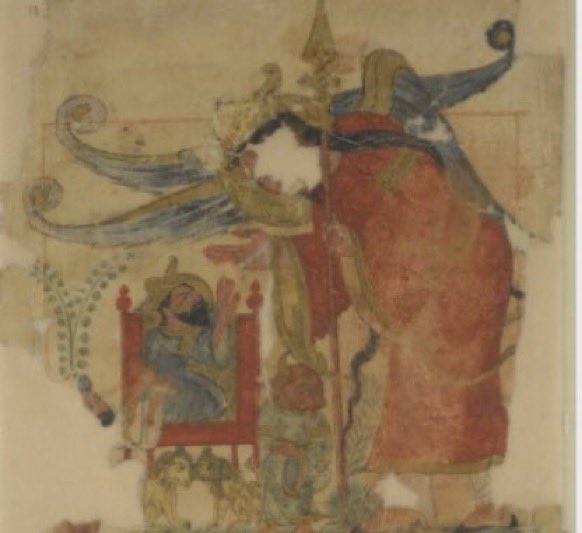In Islamic cosmology, God created humans from clay, jinn from smokeless-fire, & angels from light. As God’s unerring servants angels are so numerous the heavens groan under their numbers. All praise God, while some carry out Divine decrees relating to life and humans
A thread-
A thread-
Jibra’il, Mik’ail, Israfi’l, and Azra'il are chief of the angels.
The first two deal most directly with humans while the latter two are responsible for their end either through the Day of Judgement, or their death.
The first two deal most directly with humans while the latter two are responsible for their end either through the Day of Judgement, or their death.
Jibra’il is the angel of revelation who descends to earth frequently on orders from God.
Ibn Mas’ud describes Jibrail as robed in green while a narration from Aisha states the angel was adorned with pearls and rubies, its form filling the entirety of the sky and blotting out the Sun.
Ibn Abbas adds that Jibra’il has 600 wings and there is some allusive mention to the angel’s feet like green gemstones.
It would take bird 700 years to fly the length of Jibra'il's shoulders.
It would take bird 700 years to fly the length of Jibra'il's shoulders.
Jibrai’l is responsible for carrying out most of God’s orders, showering the righteous with blessings, and addressing the needs of humans.
Abu Sai’d relates Jibra’il washes daily in a mighty sea or river in heaven and from every drop God forms new angels known as ruhaniyyun.
Each of these angels pray for humans.
Each of these angels pray for humans.
Jibra’il guided Muhammad through his mystical journey through the heavens, Jibra’il fought alongside the Muslims at the Battle of Badr, and most importantly it was Jibr’ail who taught and revealed the Qur’an to Muhammad.
Bayhaqi from ibn Sabit says Jibrai’l manages the wind and Mik’ail the rain.
Samarqandi describes Mik’ail as saffron and topaz with countless tongues which praise God without end.
Anas b. Malik says since the creation of Hell Mika'il no longer smiles.
Since then, tears fall from the angel’s face (the same is said of Israf’il) and from each tear God creates the Karubiyum.
The Karubiyum serve alongside Mik'ail.
Since then, tears fall from the angel’s face (the same is said of Israf’il) and from each tear God creates the Karubiyum.
The Karubiyum serve alongside Mik'ail.
Mikai’l is entrusted with the rains and sustenance of all living things, for each blade of grass there is an allotment.
Together with the Karubiyum they ensure that every living thing is maintained according to God's decree.
Together with the Karubiyum they ensure that every living thing is maintained according to God's decree.
Then there are the angels who work in groups.
There are angels which watch over humans, the Hafazah, who stand before and behind all mortals (Q 13:10-11).
These angels maintain the fate of humans, protecting them until their ordained time.
These angels maintain the fate of humans, protecting them until their ordained time.
Then there are the angels which record and monitor all humans, the Hafizan (Q 50:17-18).
The Hafizan guide and record the deeds of all.
The Hafizan guide and record the deeds of all.
The angel al-Sijill is the custodian of the scroll.
According to ibn Abi Hatim, when a person dies the scroll of their life is given over to this angel to hold until the Day of Judgement.
According to ibn Abi Hatim, when a person dies the scroll of their life is given over to this angel to hold until the Day of Judgement.
Al Tabarani says Sakina is an angel who comes down in a twinkling of light to hear the Qur’an recited.
Angels pack the mosques and gatherings of the faithful, joining them in prayer and praise of God.
Angels pack the mosques and gatherings of the faithful, joining them in prayer and praise of God.
A minor tradition mentions Artay’il who lifts sorrow from the hearts of the believers and fills them with hope.
Then there are the Dardai’l who travel the world seeking out those who remember God and pray alongside them.
The Darda'il praise God, but also pray for the souls of humankind.
The Darda'il praise God, but also pray for the souls of humankind.
The catalog of angels form a particular genre of literature in classical and medieval Islamic writings. They show the porous confessional boundaries between religious communities, shared beliefs and influences, as well as an attempt to catalogue everything in heaven and on earth.
Many of these angelic stories are part of flurry of encyclopedic writings which emerge alongside the natural sciences and to the historian are evidence of the attempt to order the world around.
We’ll continue to cover Islamic history and cosmology in future threads.
• • •
Missing some Tweet in this thread? You can try to
force a refresh








